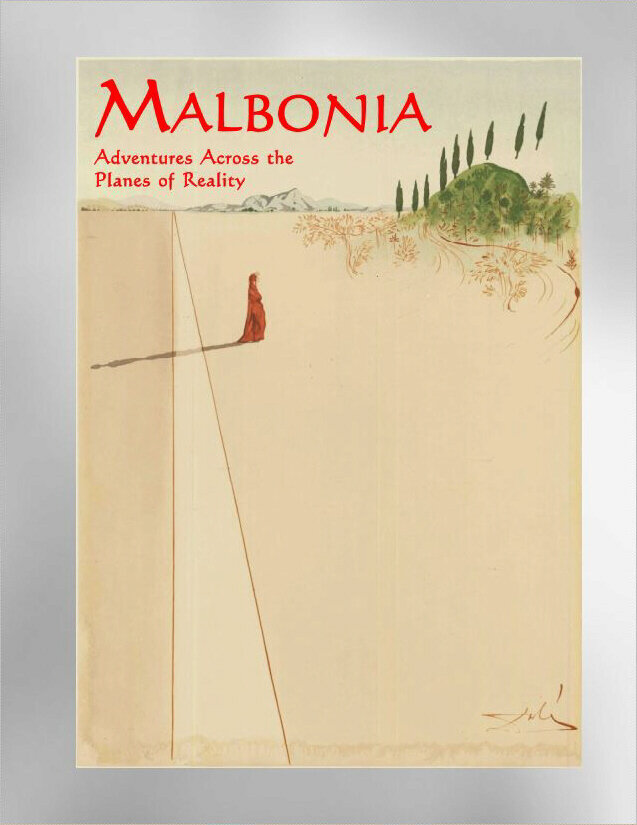Malbonia ('d-Infinity Live!' Fine Art Challenge)

Malbonia is a fan campaign setting for the 5th Edition Dungeons & Dragons role-playing game system inspired by the surrealist works of Salvadore Dali, particularly those that portray other planes of existence (foremost among them, perhaps, his series of 101 watercolor illustrations for Dante’s Divine Comedy). Adventures in this setting take place throughout the misty wastes of the Astral Plane and on the outer planes it intersects with, including the Nine Hells, Limbo, and the Seven Heavens. It was created in response to the "d-Infinity Live!" Fine Art Challenge.
Malbonia is a fan campaign setting for the 5th Edition Dungeons & Dragons role-playing game system inspired by the surrealist works of Salvadore Dali, particularly those that portray other planes of existence (foremost among them, perhaps, his series of 101 watercolor illustrations for Dante’s Divine Comedy). Adventures in this setting take place throughout the misty wastes of the Astral Plane and on the outer planes it intersects with, including the Nine Hells, Limbo, and the Seven Heavens. It was created in response to the "d-Infinity Live!" Fine Art Challenge.
Adventurers in this setting range from descendants of legendary beings like Arachne and Antaeus who may be native to various outer planes, to the inhabitants of otherwise traditional fantasy worlds who have somehow ventured into the spaces beyond their own worlds. These characters venture not just where angels and devils fear to tread but, being mortal, where supernatural beings may be unable to go. They might thus include loyal agents of good deities, craven toadies of demons princes, ruthless sorcerers, and everything in between.
Because the places where the adventures of Malbonia take place are inherently alien to normal human life, the artistic school of surrealism is perfect for illustrating them, calling into question as it does things like distance, perspective, and the very nature of reality.
Following are three sample elements from the setting, an iconic sort of monster, a race that can be used for characters and antagonists alike, and a pertinent magic item.
A typical Astral Elephant has a space about 30 feet in diameter on its back where travelers can comfortably rest. At will, and almost always when on the move, one of these creatures can evoke a shimmering field of force over this area, typically shaped like a 100-foot-tall obelisk or cone, and this will protect anything within it from being harmed by whatever environments it is passing through. Such protected spaces can generally be entered and exited at will, but some might have additional properties (e.g., require a password to enter, not allow entry by fiends or celestials, prevent aging to those within).
Astral Elephants are not easily controlled and very few riders are able to do so. It is possible to use many sorts of divination spells, however, to determine where particular creature of this sort is headed, and to thereby decide which one it is useful to hitch a ride on. Following the idea that knowledge is power however, divination spells of various sorts can often be used to unlock specific traits of individual Astral Elephants (e.g., Detect Magic might not just reveal but also open a secret portal leading into such a creature).

Arachne fled her city in shame over her transformation to half-human monster, sojourning in one lonely place after another until she finally found acceptance on the island of Chios. There, she finally realized the full extent of her plight when she gave birth to a horde of scuttling demi-spiders like herself, recoiling in horror and abandoning her cursed brood to its fate. Many of her descendants still live there and on other nearby islands, most favoring a simple existence as shepherds, farmers, or crafters, with a few choosing lives as traders, soldiers, or adventurers.
There are two distinct sub-species of Arachnaea, one that takes after a web spider and another jumping version that is more active and reminiscent of a hunting spider. Both varieties are carnivores rather than omnivores, but eat meat in a normal human way, rather than liquefying and slurping it up as regular arachnids do. In combat, web Arachaneans use their webs to help control the engagement and facilitate retreat if necessary. Jumping Arachnaeans, on the other hand, prefer to strike quickly and from multiple directions, leaping away just as rapidly if things do not go their way.
For whatever reasons, Arachnaeans tend to thrive on the various Outer Planes and, consequently, a number of deities and other powerful beings have established colonies of them there. Most of these can be found on neutrally-aligned planes such as Limbo, but such creatures might also be found serving banished Titans in Tartarus or Olympian gods in their palaces.

Each individual item of this sort will also generally have a unique minor property of some sort (e.g., give its owner advantage on Intelligence checks), and they may have specific uses on various outer planes (e.g., allow passage through a locked portal).





